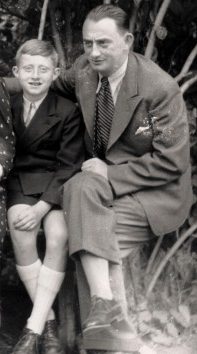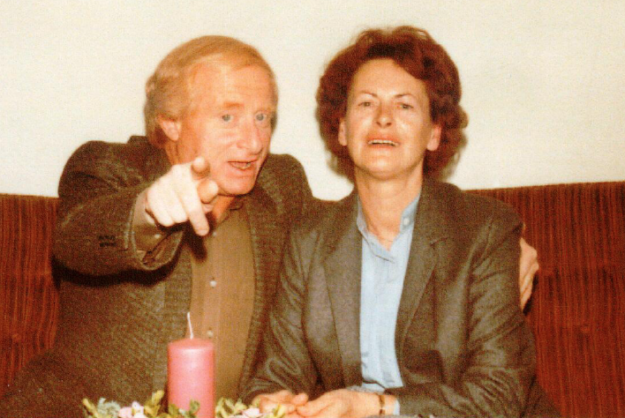
Here’s another long-time-coming post from my blog archive, this one dating back to July when my cousin Andreas Oberndorfer first discovered this blog and contacted me. I wrote about Andreas’s fascinating past, the missing links in his family — and mine — in the post Redheads, Resisters, & Red Light Districts, 1: Valerie Oberndorfer-Kornmehl.
I have many excuses, as always, for the neglect but the most concrete one here is my descent into a historic rabbit hole — one from which I have not emerged with any very satisfactory answers.

A Bit of Background
Hans Kornmehl, the son of my great uncle Martin, married Valerie Oberndorfer in the 1920s. I don’t know precisely when; Valerie was born into the Roman Catholic faith, and Hans’ family was Jewish. But since their son, Bruno, was born in 1925 and was not deemed illegitimate,* they presumably had a civil marriage before then.
Valerie converted to Judaism in 1929, and was married in the Jewish faith to Hans in 1932. She converted back to Catholicism in 1938, which probably saved her life — and maybe that of her son. Hans was sent to Auschwitz in 1942. There is a record of him being in Bergen-Belsen in 1945, but he didn’t return after the war.

What Happened to Bruno?
According to his nephew, Andreas, “Bruno survived the Nazis as a ‘submarine’ around the Castellezgasse in Vienna’s 2nd district, formerly know as “Mazzesinsel”[Matzoh island”] because most of the Jewish Viennese lived there.”
This was the part I had the problem with: I never heard of Jews surviving the war in Austria, and the term “submarine” was unfamiliar to me. Ditto the term “U-Boat,” which sometimes substituted for it according to Andreas; both, he explained, referred to “people who survived the Nazi-Regime in the local underground, who were aided and sheltered by friends or other helpers.”
Wasn’t a Jewish neighborhood the first place the Nazis would look?
Most articles I found described the rarity of survival. Typical is this one from BBC History, “Austria and Nazism: Owning up to the Past”:
Austria’s Jews, numbering over 200,000 (perhaps as many as 214,000) were a particular object of this outburst [by the Nazis]. They ranged from those who were very wealthy and highly assimilated into Austrian society, to poor migrants from Eastern Europe. All of them were now actual or potential targets of aggression. Those who did not manage to navigate their way through the thicket of emigration regulations, as they tried to escape from the country, faced an escalation of oppression (especially after the November pogrom of 1938). When flight was no longer possible those remaining in Austria (an estimated 60,000) were deported to concentration camps and murdered. Only a handful survived underground.
Was Bruno Kornmehl one of those handful? The following article in the Holocaust Encylopedia suggests his mixed heritage might have helped him:
In May 1943, Nazi German authorities reported that the Reich was judenrein (“free of Jews”). By this time, mass deportations had left fewer than 20,000 Jews in Germany. Some survived because they were married to non-Jews or because race laws classified them as Mischlinge (of mixed ancestry, or part Jewish) and were thus temporarily exempt from deportation. Others, called “U-Boats” or “submarines,” lived in hiding and evaded arrest and deportation, often with the aid of non-Jewish Germans who sympathized with their plight.
But that’s the only reference to “U-Boats” or “submarines” I could find in all my searches, including in several hefty history books covering this period. I welcome any information my readers might have about a successful underground operating in Vienna. It would make the basis for a great Netflix miniseries, no?
It could star a character based on my cousin Bruno, whose personality as well as his mixed heritage might have helped him survive.
My Cousin the Outlaw
Andreas vaguely remembers that Bruno “was said to have been a badass guy then, dealing in black market with a gang or so.” The Meyer Lansky of Vienna? Why not?
Mostly, though, Andreas describes his uncle as “a very nice and funny guy with red hair and millions of freckles whom I loved very much.”
He certainly looks affable and funny in the pictures (which Andreas is sorry he doesn’t have dates for).

Andreas largely lost touch with Bruno after his grandmother, Valerie, died in 1974 — his mother, born out of wedlock,* had a complicated relationship with the “legitimate” Kornmehl family — so the information about their lives is a bit sketchy after that. Known facts: Bruno’s wife was named Grete, and she wasn’t Jewish. They adopted a child. Bruno died in the early 2000s.
Extrapolated from the pictures: Bruno celebrated Christmas. He capitalized on his red hair with an abundance green clothing and furnishing, which is hilarious and charming.
And he kept — or returned to — his father’s name, which I find moving.
UPDATE: Michael Simonson of the Leo Baeck Institute referred me to two articles which suggest that it was indeed Bruno’s mixed heritage that saved him during the war: See Research Profile, Michaela Raggam- Blesch on ‘Half-Jews’ in Vienna, 1938–1945,” and “‘Privileged” under Nazi-Rule: The Fate of Three Intermarried Families in Vienna.'”
Next up: “This American Life (Abroad)” wherein I discuss Bruno’s musical influence on Andreas, and speculate on the parallels with my own life across the sea.
*Just as I don’t use the word “illegal” to describe people who don’t have documents issued by a particular country, so I’d like to avoid the term “illegitimate” to refer to offspring of unmarried parents — if only I could find a synonym. “Born out of wedlock” — what a term for marriage! — is too long to serve as an adjective.

Genealogists tend to call it NPE–Non-parental event. Which still doesn’t give you a really neat adjective.
Interesting — but it seems oddly inaccurate. They’re still parents, even if they’re not married, so how does that work?
I’m so glad you’re continuing these posts, Edie, especially welcome at this time.
There are some great synonyms–but I don’t know how useful– for “illegitimate” and “illegitimate child”. Some of the best are: natural, spurious, love-child, by-blow, and nullius filius. (There is also “without benefit of clergy”!)
In turn, it is nice to have you back commenting on these posts, Lydia! I’ve never heard of “by-blow” and can only guess at (well, or google) “nullius filius.”
“Nullius fillius” sounds like a term in Monty Pythons “Life of Brian”, where they talk about the “biggus dickus”. I appreciate this very much, and please don‘t worry about this. I am very content with being a son, under what circumstances ever. – But I won’t comment on “by-blow” or anything like that. Love you all. – Please inform me when you have come to a conclusion.
Ha ha, no more, I promise, the discussion is closed. I agree with you on the term “nullius fillius” — very goofy!